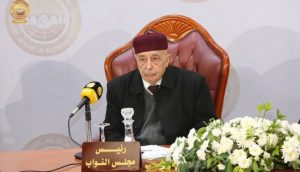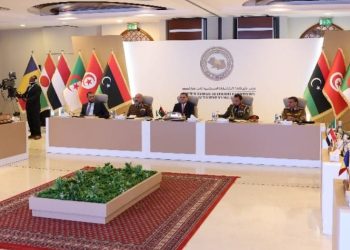By Sami Zaptia.

Tripoli, 18 January 2022:
The Speaker of Libya’s parliament (the House of Representatives – HoR), Ageela Saleh, called for the formation of a new committee to draft the country’s constitution. Saleh was speaking during his chairmanship of the opening of yesterday’s HoR session in Tobruk.
Saleh returns in his role as HoR Speaker
It was the first time that Speaker Saleh had chaired an HoR session since September 2021. Saleh had temporarily relinquished his role as Speaker last September in order to stand as a candidate in the country’s now postponed presidential elections. The election law prescribed that candidates must temporarily give up their posts three months before the planned 24 December elections.
Committee of 30 specialist to report in 30 days
Salah proposed that the new constitution drafting committee consists of 30 intellectuals, writers, thinkers, and academics specialized in constitutional law, representing Libya’s three historic regions. The committee must report within 30 days of starting its work.
He said the committee will be supported by Arab and international expertise to formulate a modern consensual constitution that meets the wishes of all Libyans and is capable of establishing a democratic state he added that it is no longer acceptable to impose a draft constitution rejected by the Libyans.
Speaking at yesterday’s HoR session that was designated to hear from Emad Sayeh, the head of the HNEC) on the postponed 24 December 2021 elections, Saleh stressed that his proposed new constitutional drafting process will not affect the conduct of the current electoral process.
Analysis:
Saleh’s new constitutional reform proposal opens a pandora’s box
HoR Speaker Saleh’s new constitutional reform proposal opens a pandora’s box. There is good reason why the issue of Libya’s permanent constitution has not been resolved since the overthrow of the Qaddafi regime in 2011. It is a political and ethnic minefield.
Saleh knows that the current draft constitution was drafted by the Constitutional Drafting Assembly (CDA). The CDA is an elected body. It will not be easy for Saleh and the elected HoR to cancel it overnight. It will open up even more legal contestability in the realm of Libyan politics.
The vexed draft constitution – rejection by Tebu and Amazigh
It will be recalled that the elected Constitutional Drafting Assembly (CDA) had initially presented the HoR with its latest draft constitution in July 2017, but a (lower) court ruling in the eastern city of Beida in August of the same year had prevented the HoR from debating/approving the draft.
However, the Supreme Court subsequently overturned that ruling in February 2018, clearing the way for the HoR to debate and vote on the draft constitution.
It must, nevertheless, also be kept in mind that the Amazigh boycotted the CDA elections in February 2014 and the two ethnically Tebu members of the CDA had not voted in favour of the ‘‘approved’’ draft constitution.
Under the existing voting rules, the constitution has to be accepted by at least one of the two CDA members from each of the three ethnic communities in Libya – the Amazigh, Tebu and Tuareg. In theory, their failure to vote for the draft constitution voids the vote on the draft constitution. Nevertheless, the HoR chose to ignore this anomaly and proceeded with adopting it. But despite this, the HoR, driven by Ageela Saleh, could not force the Tripoli-based Libyan governments nor HNEC to organise a referendum on the contested draft constitution. The operative Libya political roadmap/temporary constitution prescribes that the draft constitution must be approved by a popular referendum.
Libya remains in a constitutional limbo
Thus, Libya remains in a constitutional limbo operating under the 2011 Transitional Constitutional Declaration (TCD) and its subsequent amendments and political roadmaps (Skhirat and the Libyan Political Dialogue Forum).
Weak, unconstitutionally selected governments unable to move Libya forward
The TCD does not produce a strong, fully mandated legitimate government that can implement radical reforms of the inherited Qaddafi system. Libya needs a strong government 11 years after the overthrow of the Qaddafi regime to reform the old system and deliver the much-needed public services such as security, stability, health, cashflow, petrol, cooking gas, electricity, infrastructure etc. Only with new elections, preferably constitutionally based ones – can provide the hope and possibility of reform, development and progress.
Libyans must have right to vote on draft constitution through referendum: CDA | (libyaherald.com)
Amazigh Supreme Council boycotts planned referendum on draft constitution | (libyaherald.com)
HoR commences discussion of draft constitution and its referendum | (libyaherald.com)
CDA vote on draft constitution ruled invalid by Beida court | (libyaherald.com)
New draft constitution “gives everyone something and nobody everything” | (libyaherald.com)









